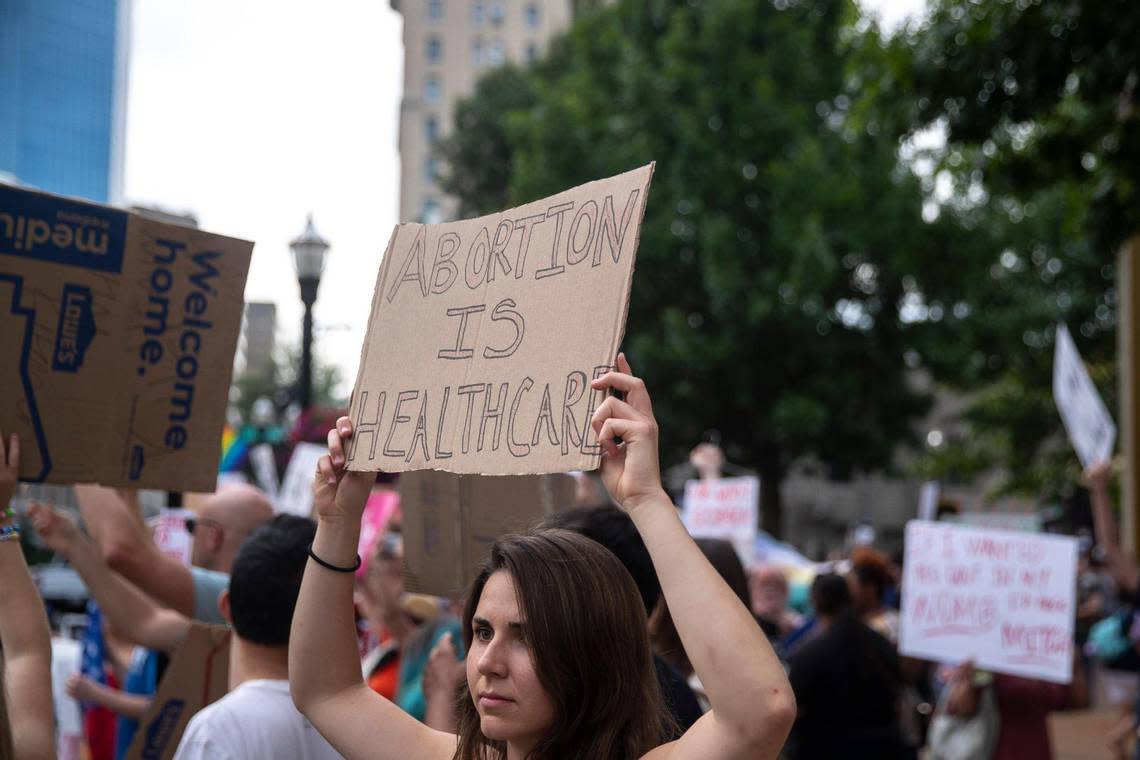Will KY’s trigger law banning abortion be blocked? Lawyers square off in courtroom

Kentucky’s two abortion providers who are suing the state over laws banning nearly all abortions argued on Wednesday why a judge should block that ban for even longer.
Calling witnesses including a University of Louisville board-certified OB-GYN and then a Texas economics professor, Planned Parenthood and EMW Women’s Surgical Center sought to show the adverse medical and financial impacts of a statewide ban in hopes of convincing Jefferson Circuit Court Judge Mitch Perry to issue a preliminary injunction.
“Abortion is essential medical care and people have the right to determine whether or not they wish to bear children and the number and spacing of those children,” said Dr. Ashlee Bergin, a Louisville OBGYN who also provides abortions at EMW. “The ability to control whether to carry a pregnancy to term, or to terminate a pregnancy, is essential to a woman’s overall health.” If that autonomy is revoked, “the consequences will be dire.”
Dr. Jason Lindo, an economics professor at Texas A&M who studies economic impacts of abortion and contraceptive policies and is research associate at the National Bureau of Economic Research, said Kentucky’s trigger law will financially burden Kentuckians, disproportionately affecting minorities.
Beyond reducing access, the trigger law will “impose serious costs, disproportionately borne by Kentucky’s most vulnerable populations: low-income residents and people of color,” he said.
Kentucky’s trigger law banning nearly all abortions took immediate effect when the U.S. Supreme Court overturned Roe v. Wade late last month. Planned Parenthood and EMW Women’s Surgical Center sued the state, arguing that a right to privacy, and by extension bodily autonomy, is protected under the Kentucky Constitution. Judge Perry granted that request last week, temporarily blocking the trigger law while he considers whether to grant a preliminary injunction, a hearing for which lasted most of the day on Wednesday.
At that hearing, legal counsel for Attorney General Daniel Cameron, who has unsuccessfully petitioned all three levels of Kentucky’s court system to allow him to enforce the trigger law, drew focus to his argument that abortion causes the death of a “pre-born child,” first through cross examination, and then with expert testimony.
“Would you agree that abortion actually stops a beating heart?” Deputy Attorney General Victor Maddox asked Bergin.
“That’s not how I view it,” she said.
He asked whether, in consulting with pregnant patients about their options, if she considered a fetus one of her patients: “you don’t consider the fetus she’s carrying to be a patient of yours?” Maddox also asked whether the board-certified OBGYN had medical ethical “concerns” that aborting a fetus with a heartbeat means “you’re terminating a life.” Bergin said no to both.
Before asking if she considers a “viable, pre-born child to be a human being,” Maddox asked Bergin, when examining ultrasounds, “have you seen the baby about to be aborted recoiling from the instruments?”
Bergin said she hadn’t.
Anti-abortion witnesses
Counsel for the Attorney General first called Dr. Monique Chireau Wubbenhorst, a board-certified OBGYN and fellow of the American College of Obstetricians and Gynecologists, as an expert witness.
Wubbenhorst, who said she’s “pro-life,” filed an amicus brief with the Catholic Association in Dobbs v. Jackson Women Health Center — the case upheld by the U.S. Supreme Court in late June that overturned Roe v. Wade.
In her testimony on Wednesday, Wubbenhorst was explicit: “abortion is not heath care,” she said, arguing that choosing to terminate a pregnancy for a medical reason and opting for an elective abortion were distinctly different.
“Intent matters very much,” she said, and the “goal of abortion is to kill a baby.”
Her brief in Dobbs walks through how the medical landscape for charting a pregnancy has changed in recent decades, including the accuracy of ultrasounds, and implored the high court to return the ability to govern abortion to the states.
“Scientific advancement over the last 48 years have multiplied, not reduced those doubts” that the federal Constitution protects a woman’s right to an abortion, she wrote. “The humanity of the unborn child is undeniable.”
The AG’s next expert witness was Professor O. Carter Snead, law professor at the University of Notre Dame and director of the de Nicola Center for Ethics and Culture who also submitted an amicus brief in Dobbs. He said he was invited by Cameron’s office to “offer an account of why it’s ethically defensible to take the position that the unborn child should be protected in the law, (and) to give a kind of ethical analysis of the state’s interest in promoting those laws.”
Wading into the bioethical debate over the “moral standing of a human,” Snead said there are people who believe, in order for a fetus to be designated as a human being, certain criteria must be met. But he argues there shouldn’t be a “moral distinction between human beings and a person.” What matters is “whether they are living members of the human species,”and if so, life begins at conception, he said.
Snead, who has long advocated for the reversal of Roe, said there are “ethically defensible” reasons why a state like Kentucky would adopt a trigger law, even though it doesn’t include exceptions for rape or incest.
“Taking the life of an innocent human being, even out of the motivation of a woman who has been criminally and grotesquely violated is . . . compounding one injustice with another,” he said, adding, “without duly considering the moral standing of an unborn human being as an equal member of the human family is a kind of discrimination.”
A pregnant person’s right to liberty and privacy does not extend to an intrinsic right to an abortion, he said. “Liberty ends when another’s bodily interests begins.”
Judge Perry asked all parties to file their pleadings by July 18, after which he will make a decision on the injunction.
